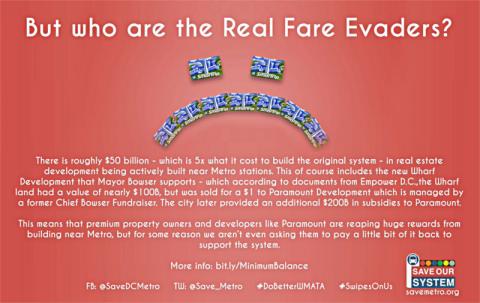Metro gets an earful on bad service, high fares, and revenue-based policing at board meeting
![]() NJNP Steering committee member Latinxrex speaks on limited Metro service forcing some to trade sex for housing close to jobs
NJNP Steering committee member Latinxrex speaks on limited Metro service forcing some to trade sex for housing close to jobs
On Jan 31, Save Our System, No Justice No Pride, Black Youth Project 100, and others packed Metro's board meeting. Speakers charge Metro is trying to "solve their problems on the backs of the riding public, and trying to fund themselves by soaking poor residents while developers ride for free with huge projects made possible by Metro.
Statements by witnesses republished on Twitter included “We can’t pass the buck on people who have no choice but to use metro. We need a $2 flat fare and free transfers,” “Targeting those who are already struggling is the wrong way to address WMATA’s ongoing financial and political crisis,” “If you can increase trains in wealthier areas, maybe you can provide free or reduced transit to low income riders," and even a wealthier rider saying “Tax me more, don’t privatize metro.” Jack Evans was asked if he drove to the Metro hearing. A decade ago, no less than FOX News caught most of Metro's board not using Metro to get to board meetings by pulling up their computerized Smartrip records. That incident also illustrates the dangers of trackable registered Smartrip cards.
One speaker chewed out Metro for sending four cops to pull a Black women aside for alleged fare evasion
Unfortunately there were also speakers demanding even more police on Metro to harass and presumably to drive away African-American students riding Metro after school. Perhaps those speakers should have been handed some of Trump's MAGA hats.
The combination of Metro's new "no negative balance" policy on Smartrip cards with aggressive police profiling of Black and Brown riders as potential "fare evaders" is considered especially dangerous. It means anyone who is not white and makes a mistake about just how far they can ride with the money they are carrying and the existing balance on their Smartrip card risks arrest. The riders most at risk for these policies are the same riders least able to afford a car to protect themselves from Metro's cop-infested system and attitude. Problems with Metro probably do play a role in the recent very large increase in bicycle ridership in DC, but when the cold winds blow and drenching rains fall many of these bicycle riders disappear from the bike lanes.
Prior to 2001 Metro was considered the jewel of US transit systems, and actually recovered 75% of the operating costs of Metrorail from the fare box even after a late 1998 fare reduction aimed at spurring ridership. The fare cut worked: empty trains filled and Metro made more money while charging less money. After Sep 11, a lot of tourist money dried up, and a series of bad management decisions started a death spiral of rising fares, more restrictions, service cuts, and maintainance "deferrals." The decision not to take care of the system led to the infamous 2009 fatal crash of one train into another, and that drove still more riders off Metro. Then came still more fare hikes and experiments with "random" bag searches. There seemed to be more and more cops in Metro, fares skyrocketed, and paper farecards that did not cost one-time tourist users an extra $2.50 were dropped. Meanwhile bus routes were cut and rail hours reduced. Thus we now get such reports as people having to stay with roomates who demand sex in return for being able to avoid having to live where Metrobus no longer goes or travel in hours no longer served by Metrorail.



